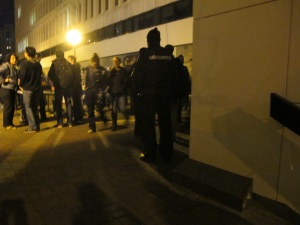(Editor’s Note: This is cross-posted with permission from the blog of Women in Cities International, based in Montreal, Canada.)
From March 18th to 24th, 2012, we celebrated the second edition of International Anti-Street Harassment week….As one of the (many!) co-sponsors of this great event, Women in Cities International partnered with radio station CKUT and the 2110 Gender Advocacy Center, two Montreal-based organizations also working on special programming for Women and Girls, to organize an introductory Women’s Safety Audit walk (WSA).
For our purpose, this WSA was meant to introduce participants to its methodology, while sensitizing them to women’s security and inclusion (or lack thereof) in public space. We did this by analyzing various factors of our urban environment and how they affect how each of us participates in city life. Such factors may include built infrastructure (lighting, sidewalk width, etc.) as well as user characteristics or behaviors, including women to men ratio and…. street harassment!
 A group of seven women took part in the WSA, around the downtown Concordia Campus area in Montreal, starting from the 2110 Gender Advocacy Center McKay office, walked along to Bishop street via an alley way, down to de Maisonneuve and back. Participants were asked to pay attention to lighting, maintenance, accessibility of sidewalks and buildings, the absence of greenery or parks, or just opportunities to linger. Perfectly in tone with the theme of out activity, a group of male students drinking on the Reggies pub terrace, overlooking the alley we were auditing, tried to get our attention in a not so subtle way… A group of women walking through an alley appears to be cause for attention.
A group of seven women took part in the WSA, around the downtown Concordia Campus area in Montreal, starting from the 2110 Gender Advocacy Center McKay office, walked along to Bishop street via an alley way, down to de Maisonneuve and back. Participants were asked to pay attention to lighting, maintenance, accessibility of sidewalks and buildings, the absence of greenery or parks, or just opportunities to linger. Perfectly in tone with the theme of out activity, a group of male students drinking on the Reggies pub terrace, overlooking the alley we were auditing, tried to get our attention in a not so subtle way… A group of women walking through an alley appears to be cause for attention.
It also happens that downtown Montreal is currently the stage for daily manifestations by disgruntled students calling on the government to cancel the planned hikes of education fees. On March 20th, students had blocked off part of de Maisonneuve with couches, were playing music, showcasing their message through banners and slogans. This new, albeit temporary use of the street, drew attention to how the re-appropriation of public space by citizens can be a powerful tool not only as a pressure tactic (as it was here), but as a way to make it safer and more inclusive, on the condition that the measures used attract a greater diversity of users.
As we ended our WSA, participants asked us if we could organize another such walk on a Saturday on Crescent street at 3:00 am, when folks leave the bars and clubs and the famed Montreal street can become a very uncomfortable place for many women. Reminding us once more how street harassment is a big problem, in every city, no matter how safe, and that we need to keep calling it out and denouncing it as unacceptable.
